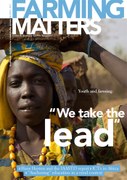Young people can contribute enormously to farming and agriculture production – and in many cases they already do so. How to strengthen or support their efforts? These are some of the many interesting examples we have found.
Nepal: Finding sources of inspiration
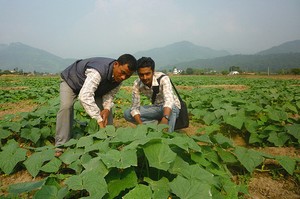
Empowering young farmers takes on many forms – from giving them the tools they need to getting them to give their views about future agriculture policies. One interesting method is to get young farmers to meet and exchange and share ideas, and thereby inspire each other. This is what farmers like Prem Bahadur Rajali and Samsher Rajali are doing in Nawalparasi, Nepal. They are following the example of Mr Rabindra Rajali, a young farmer from Deurali. In less than five years he has increased his land under cultivation to almost two hectares, growing off-season vegetables such as tomato, potato, cabbage, cauliflower and cucumber and selling them for a profit in Kathmandu.
Although he didn’t finish school, he now owns a tractor, two pairs of bullocks, and more than 20 goats. He also leases three hectares of land from the local school, and provides work to four neighbours. Those who visit his farm hear that “to be successful, young people have to forget about their pride”. His neighbours are encouraged by his example which shows that agriculture is not a poor man’s job. “And if that is sometimes the case, then that is certainly not a crime!”
More information?
Write to Dinesh Panday, student at IAAS, Nepal.
E-mail: relorteddinesh@gmail.com
CGIAR: Showcasing the “Growing Talents”
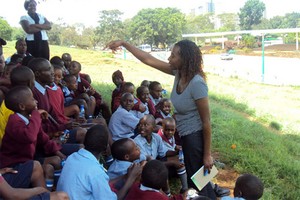
The ICT-KM Program of the CGIAR aims to strengthen information and knowledge exchange processes between the world’s agricultural research institutions. With the launch of the International Year of Youth, the programme decided to highlight the work and opinions of some of the many enthusiastic and talented young individuals they regularly interact with, considering that “while there is no substitute for the experience, knowledge and wisdom that comes with age, young people can add a different perspective and offer fresh ideas”.
The result is a series of interviews which present these young people’s perspectives, experiences and aspirations. These are organised into a number of chapters, which can all be found online. To date, these chapters include interviews with an intern at ICRAF, a specialist with the World Fish Center, or with a GIS expert working in Kenya. With the debate and discussions that follow, every interview helps the programme in its mission of facilitating the exchange of information.
More information?
Write to Enrica Porcari, Chief Information Officer for the CGIAR and Leader of the ICT-KM Program (e.porcari@cgiar.org), or visit their website: http://ictkm.cgiar.org/youth-in-agriculture
Indonesia: Having nature as a teacher
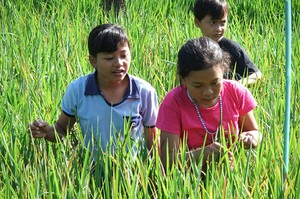
The heartland of Indonesia’s Green Revolution can be found a few kilometres north of the city of Karawang. Farmers use fertilisers and a large number of pesticides, while their children want to migrate to the city. This is where, in 2006, Kaliaget Organic Farm started an informal community school for children. Up to 24 children follow the growth of paddy rice, meeting once every week in the 3.5 hectare farm. The teaching materials are based on training manuals prepared for Farmer Field Schools.
Although activities with children are carried out in a more playful way than the “regular” FFSs, the children perform the same observations and do very similar analyses. After only a few weeks all the participants realise how much there is to “discover” in a rice field, giving them a totally different idea about what is otherwise seen as “routine work” (according to some farmers) or “dirty work to be avoided” (as most children used to think). The work in Kaliaget shows how a small investment can help develop a positive and inquisitive attitude, contributing to children learning from, and loving, nature.
More information?
Write to Paul ter Weel, at the Kaliaget Organic Farm and School, West Java, Indonesia.
E-mail: paulterweel@gmail.com
Bosnia and Herzegovina: Linking participation with income
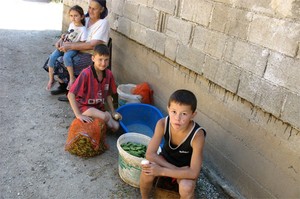
Farmers in many countries in the European Union have stopped producing pickling cucumbers as it is a highly labour-intensive activity. So farmers in the eastern part of the continent are making good use of the opportunity, and are producing these cucumbers for the western market. These farmers are receiving the support of organisations such as the Lutheran World Federation, with positive results. Different projects are helping develop efficient marketing strategies, strengthening farmer organisations, and also providing loans through revolving funds.
As a result of these efforts, three cooperatives in the Cazinska Krajina region, close to the border with Croatia, are producing and exporting large quantities of cucumbers. More than 2,000 farming families are part of these co-operatives. The cucumberpicking season lasts two months and is always during the summer school vacation; so many children are actively involved in picking the cucumbers or sorting them on different categories. In this way they bring some extra money into the household and also support themselves: many farmers say that the children use the money they earn for their school books.
More information?
Write to Enes Kurtović, field agronomist at Terra Sana, Association for Economic Development and Employment, Sanski Most, Bosnia-Herzegovina.
E-mail: enes.kurtovic@terrasana.com.ba

